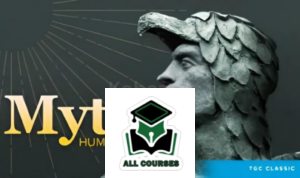Gnosticism: From Nag Hammadi to the Gospel of Judas By David Brakke
Gnosticism: From Nag Hammadi to the Gospel of Judas By David Brakke course is now available at an affordable price. You can check out directly using multiple payment gateway options. If you have any questions or need an alternative payment method, feel free to contact us.
Gnosticism: From Nag Hammadi to the Gospel of Judas – A Comprehensive Review – Instant Download!
Let’s embark on a captivating adventure to uncover remarkable insights that spark your curiosity and elevate your understanding
Gnosticism: From Nag Hammadi to the Gospel of Judas By David Brakke
Overview
Gnosticism: From Nag Hammadi to the Gospel of Judas – A Comprehensive Review
The exploration of gnosticism has long captivated scholars and enthusiasts alike, especially with the revelations housed in the Nag Hammadi library and the intriguing narratives found in texts such as the Gospel of Judas. In his audio course, “Gnosticism: From Nag Hammadi to the Gospel of Judas,” David Brakke presents a compelling examination of gnostic writings and their implications for understanding ancient Christian thought. This review will delve into various perspectives on the course, highlighting its strengths, weaknesses, and the vibrant tapestry of insights it weaves around gnostic ideologies.
Course Overview and Structure
The course offers a multifaceted approach to gnosticism, beginning with the early sects, specifically the Marcionites and Valentinians, before expanding into non-Christian gnostic beliefs. Brakke’s methodical organization of content allows listeners to build a foundational understanding of the various schools of thought that shaped gnostic beliefs.
Introductory Concepts:
Gnosticism as a complex religious movement
Distinction between gnostic and orthodox Christian beliefs
Historical context of the Nag Hammadi library discovery in 1945
Key Gnostic Texts:
Exploration of significant manuscripts including the Gospel of Judas
How these texts redefine traditional biblical narratives
Differences in theological interpretations compared to orthodox writings
Thematic Exploration:
Examination of central themes such as enlightenment, the nature of the divine, and the role of the material world
Brakke’s exploration is lauded for its depth, seamlessly integrating various facets of gnostic belief systems while engaging listeners with both scholarly insights and accessible rhetoric. His perspective is particularly valuable for those seeking a thorough introduction to the subject and is designed to provoke thought and discussion around the complexities of ancient religious beliefs.
Diverse Reactions and Perspectives
Positive Feedback: Depth and Insight
Critics have applauded the course for the comprehensive breadth of topics covered. Anne, a listener, commended Brakke for the in-depth exploration and insights into ancient Christianity and gnostic sects. She particularly appreciated the course’s ability to shed light on the lesser-known aspects of gnostic thought, making it accessible for those new to the topic.
Highlights of Anne’s Review:
The course is seen as a thorough introduction to gnostic ideologies.
Inclusion of non-Christian gnostics adds richness to the narrative.
Brakke’s structured approach helps clarify complex ideas.
This approach effectively raises awareness of the subtleties in early Christian thought, encouraging listeners to approach these ancient narratives with an open mind and a critical lens.
Critical Perspectives: A Carnival of Ideas
Conversely, not all feedback has been as favorable. Josh, reflecting on his experience, found the transition from traditional biblical texts to gnostic writings to be disorienting metaphorically likening it to entering a “wacky, and at times sinister, carnival funhouse.” His criticism centered on the radical reinterpretation of biblical elements, particularly the inversion of the creator god’s character and the depiction of Judas as a hero. These aspects left him unsettled.
Key Points from Josh’s Review:
Concern over the portrayal of gnosticism as a legitimate offshoot of Christianity.
The secular tone in Brakke’s narrative may alienate traditionalists.
Overlooked the syncretistic nature of gnostic thought, which diverges from early Christian beliefs.
Josh’s perspective serves as a reminder that while Brakke aims for an inclusive view of religious thought, the legacy of gnosticism remains contentious, with many adherents to more orthodox interpretations wrestling with these radical shifts in narrative.
Scholarly Approach vs. Personal Belief Systems
Brakke’s work is framed through a scholarly lens, aiming to explore gnosticism as an influential strand in the tapestry of ancient spirituality. However, his secular methodology has drawn mixed responses. For some, particularly those from more traditional backgrounds, this approach may seem impersonal and detached from faith-based interpretations.
Implications of Brakke’s Approach:
Challenges traditional notions of authenticity in religious interpretation.
Encourages a deeper examination of historical and cultural contexts
Opens the floor for academic debate regarding the relevance of gnostic texts today.
In an era where spiritual belief systems are frequently examined through the lens of modernity, Brakke’s reliance on secular analyses sheds light on how ancient ideas can resonate or clash with contemporary beliefs, creating fertile ground for discussion on the nature of faith.
Exploring the Gnostic Narrative
Central to gnostic thought is the assertion that knowledge (or gnosis) serves as a pathway to spiritual salvation, a notion starkly different from the teachings of orthodox Christianity. The Gospel of Judas is a key text that Brian chooses to focus on, presenting an inverted portrayal of the character of Judas Iscariot. Instead of being the villain of the biblical narrative, Judas emerges as a pivotal figure whose actions lead to a higher understanding of the divine.
Key Themes in the Gospel of Judas:
Reinterpretation of traditional biblical characters
The portrayal of Judas as a hero or enlightened figure
Exploration of dualisms present in gnostic texts
This reframing of narratives invites listeners to reconsider their preconceived notions of biblical figures, urging them to engage with these texts through multiple layers of meaning. Such perspectives challenge the monolithic views often maintained within orthodox traditions.
Conclusion
In summary, Brakke’s course “Gnosticism: From Nag Hammadi to the Gospel of Judas” provides a significant contribution to the discourse surrounding gnostic beliefs, navigating the nuanced relationships between early Christianity and diverse gnostic sects. While the content is rich and insightful, the responses reflect the delicate balance between faith and scholarship. This course stands as both an informative guide for the curious learner and a provocative challenge for traditionalists, encouraging continuous exploration and dialogue around the intricate world of gnosticism. Through Brakke’s lens, listeners are equipped not only with knowledge but also with the impetus to further investigate the profound impact of these ancient teachings on spiritual thought.
Frequently Asked Questions:
Innovation in Business Models: We use a group purchase approach that enables users to split expenses and get discounted access to well-liked courses. Despite worries regarding distribution strategies from content creators, this strategy helps people with low incomes.
Legal Aspects to Take into Account: Our operations’ legality entails several intricate considerations. There are no explicit resale restrictions mentioned at the time of purchase, even though we do not have the course developers’ express consent to redistribute their content. This uncertainty gives us the chance to offer reasonably priced instructional materials.
Quality Control: We make certain that every course resource we buy is the exact same as what the authors themselves provide. It’s crucial to realize, nevertheless, that we are not authorized suppliers. Therefore, the following are not included in our offerings: – Live coaching sessions or calls with the course author.
– Entry to groups or portals that are only available to authors.
– Participation in closed forums.
– Straightforward email assistance from the writer or their group.
Our goal is to lower the barrier to education by providing these courses on our own, without the official channels’ premium services. We value your comprehension of our distinct methodology.
Reviews
There are no reviews yet.
Be the first to review “Gnosticism: From Nag Hammadi to the Gospel of Judas By David Brakke” Cancel replyYou must be logged in to post a review.
Delivery Policy
When will I receive my course?
You will receive a link to download/view your course immediately or within 1 to 24 hrs. It may takes few minutes, also few hours but never more than 24 hrs. Due to different time zone reasons.
How is my course delivered?
We deliver courses through Google Drive or Telegram. Once your order is complete, you?ll receive an email with a Google Drive or Telegram channel access link to view/download the course.
In case you submit a wrong email address, please contact us to resend the course to the correct email.
Where can I find my course?
Upon completing your order, a link to download or access the course will be sent to your email. Alternatively, you can find it in the ‘My Account’ download section.
If you do not see it there, please share a screenshot of your order and payment with me on Telegram at @ bossallcourses_bot to ensure prompt assistance. I am highly responsive on Telegram.








Reviews
There are no reviews yet.